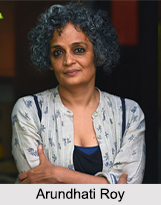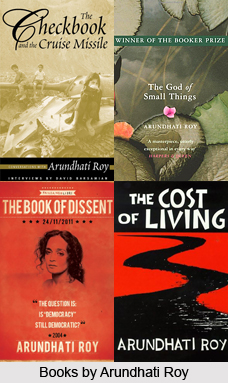 Arundhati Roy is a popular writer, activist and novelist of the Indian subcontinent. She was born in the family of Keralite Syrian Christian mother and a Bengali Hindu father in Shillong which forms a part of the Indian state of Meghalaya. Her mother was a woman`s rights activist and her father was a tea planter by profession. She spent her childhood days in Aymanam in the Indian state of Kerala. She finished her schooling from Corpus Christi School in Kottayam followed by The Lawrence School, Lovedale that is situated in the Nilgiris. After schooling she studied architecture at the School of Planning and Architecture in Delhi.
Arundhati Roy is a popular writer, activist and novelist of the Indian subcontinent. She was born in the family of Keralite Syrian Christian mother and a Bengali Hindu father in Shillong which forms a part of the Indian state of Meghalaya. Her mother was a woman`s rights activist and her father was a tea planter by profession. She spent her childhood days in Aymanam in the Indian state of Kerala. She finished her schooling from Corpus Christi School in Kottayam followed by The Lawrence School, Lovedale that is situated in the Nilgiris. After schooling she studied architecture at the School of Planning and Architecture in Delhi.
Literary Life of Arundhati Roy
Among her first works is the criticism of Shekhar Kapur`s film Bandit Queen, based on Phoolan Devi. It is in this work that she charged the filmmaker for misinterpreting both the life of Phoolan Devi and its meaning. Arundhati Roy started writing her first novel, The God of Small Things in the year and finished the work in 1996. This book is regarded as a semi-autobiography in which she relates to the audience about her childhood experiences in Ayemenem. For this book she also received the Man booker Prize for Fiction in 1997 and it was also listed as one of the notable books of 1997 in New York Times. The book was such a huge success that it not only reached the fourth position in the New York Times Bestsellers list for Independent Fiction but also received half a million pounds as an advance and rights to the book were sold in 21 nations. She is also credited for writing the screenplays for In Which Annie Gives it Those Ones in 1989 and Electric Moon in 1992 and also a television serial named The Banyan Tree. A documentary named A Film with Arundhati Roy was also written by her in 2002. In the early half of the year 2007 she announced that would began her work on her second novel.
 Arundhati Roy is also involved in many social activities. She is the figurehead of the anti-globalization or alter-globalization movement and also a vehement critic of neo-imperialism and of the global policies of the United States of America. The lists of her criticisms include India`s nuclear weapon policies and the approach to industrialization and rapid development as bring practiced in the nation in the recent times. She was also personally involved with activist Medha Patkar in the campaign against the Narmada Dam Project. According to the judgment of the Supreme Court of India she also served one-day imprisonment and paid a fine of Rs. 2000. Arundhati Roy was awarded the Lannan Foundation`s Cultural Freedom award for her work related to the civil societies that are adversely affected by the world`s most powerful governments and corporations. She was also awarded the Sydney Peace Prize in the year 2004 for her significant contribution in social campaigns and her advocacy of non-violence. In the month of January of the year 2006 Arundhati Roy was awarded the Sahitya Akademi award for her collection of essays on the contemporary issues.
Arundhati Roy is also involved in many social activities. She is the figurehead of the anti-globalization or alter-globalization movement and also a vehement critic of neo-imperialism and of the global policies of the United States of America. The lists of her criticisms include India`s nuclear weapon policies and the approach to industrialization and rapid development as bring practiced in the nation in the recent times. She was also personally involved with activist Medha Patkar in the campaign against the Narmada Dam Project. According to the judgment of the Supreme Court of India she also served one-day imprisonment and paid a fine of Rs. 2000. Arundhati Roy was awarded the Lannan Foundation`s Cultural Freedom award for her work related to the civil societies that are adversely affected by the world`s most powerful governments and corporations. She was also awarded the Sydney Peace Prize in the year 2004 for her significant contribution in social campaigns and her advocacy of non-violence. In the month of January of the year 2006 Arundhati Roy was awarded the Sahitya Akademi award for her collection of essays on the contemporary issues.
Personal Life of Arundhati Roy
While studying Architecture at School of Planning and Architecture in Delhi, she met her first husband, Gerard Decunha who is also a renowned architect. It was with her second husband Pradip Krishen that Arundhati Roy ventured into filmmaking in the year 1984. The first cousin of Arundhati Roy, called Pranay Roy is also a prominent media personality and is settled in New Delhi.
Books by Arundhati Roy
* The God of Small Things.
* The End of Imagination.
* The Cost of Living. Flamingo
* The Greater Common Good.
* The Algebra of Infinite Justice.
* An Ordinary Person`s Guide To Empire.
* Introduction to 13 December, a Reader: The Strange Case of the Attack on the Indian Parliament.
* The Shape of the Beast: Conversations with Arundhati Roy.
* Listening to Grasshoppers: Field Notes on Democracy
* Walking with the Comrade
Awards Won by Arundhati Roy
* Arundhati Roy was awarded the 1997 Booker Prize for her novel The God of Small Things.
* She won the National Film Award for Best Screenplay in 1989, for the screenplay of In Which Annie Gives It Those Ones.
* In 2002, she won the Lannan Foundation`s Cultural Freedom Award
* In 2003, she was awarded `special recognition` as a Woman of Peace at the Global Exchange Human Rights Awards in San Francisco with Bianca Jagger, Barbara Lee and Kathy Kelly.
* Roy was awarded the Sydney Peace Prize in May 2004 for her work in social campaigns and her advocacy of non-violence.
* She was awarded the Sahitya Akademi Award in 2006.
* In November 2011, she was awarded the Norman Mailer Prize for Distinguished Writing.













